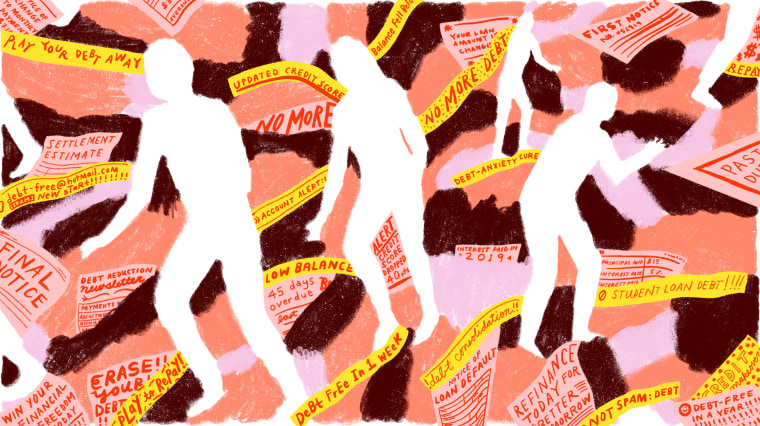Sarah Oliver, 26, regularly sees offers from a variety of companies claiming they can alleviate her student debt.
But these aren’t companies specializing in refinancing or improved savings plans. These offers come from companies that don’t have anything to do with debt: a trivia app, Burger King, a game show, and even Natural Ice beer.
“I think it's a little sad that things like this have to exist because it’s such a problem,” Oliver said.
Oliver is one of the 44 million Americans carrying debt from her college education; hers is in the five figures. And as Americans like Oliver become further saddled with debt — holding a combined $1.47 trillion in student loans at the end of 2018 — the topic has itself become part of the cultural milieu. The issue is now so pervasive that it shows up in song lyrics, TV plotlines and presidential platforms.
And, of course, marketing campaigns. Companies are seizing on the crisis, using it as a way to market their goods and services in a way they say brings more attention to the topic and offers a lifeline to some weary graduates.
Advertising watchdogs counter that companies only help a few people while profiting off the rest.
“Can it be a successful campaign to focus on providing someone with hope that their financial hardships will be wiped away? Yes,” said Bonnie Patten, the executive director of Truth in Advertising, a nonprofit that works to educate and protect consumers against false advertising and deceptive marketing. “But, in the long run, the only people who really win at those games are the companies.”
Burger King launched one of the biggest student debt-focused campaigns in late May, tweeting, “got student loans? what's ur $cashtag.” The tweet generated 94,000 replies, and the fast-food chain told NBC News that 800 people who responded got some money sent to their account.
Burger King then followed up the tweet by announcing its new marketing campaign, Whopper Loans. The idea is fairly simple and seemingly innocuous: buy some food through its app, enter your information and the amount of your monthly student loan payment, and you could be eligible to win. One person will win up to $100,000, and 300 people will get $500 for their loans.
About a year before Whopper Loans, Natural (Natty) Ice announced a similar plan, saying the company would give away $1 million to pay off student loans. To win, participants had to make a video proving they bought the beer and discussing their college experience. The company repeated the stunt in 2019.
Patten doesn’t think these offers are harmless. “It wasn't like it was free to play the sweepstakes,” she said. For a chance to win, players pay by giving up a lot of their personal data for the companies’ gain.
“I think it shows how desperate people are, and I don't mean that in a derogatory way,” Oliver said of the various ways companies have begun to market toward people like her, graduates out of school with thousands in debt who feel like they’ll be paying it off for the rest of their lives.
Other corporate efforts have used student debt as a central device for a new venture. In 2018, the cable channel TruTV debuted “Paid Off,” a game show in which contestants compete for money to pay off their loans, often in college-themed games and trivia contests. Everyone who competes goes home with some money, some in the hundreds of dollars and others in the tens of thousands. (TruTV is owned by NBCUniversal, the parent company of NBC News.)
Michael Torpey, the host of the show, said he recognized its “absurd” nature, which he said is meant as a commentary on the student debt crisis.
“Isn’t it crazy that this show is what we need?” he said. “This is what it has come to, to pay for education.”
Torpey understands why some might think that his show is insensitive, or that it trivializes a serious issue, especially because “Paid Off” is supposed to be fun to watch. “For some people, the student debt crisis is so painful that there is no room for laughter,” he said. “My strategy is just different.”
For Oliver, the for-profit app Givling is her sweepstakes of choice. The company runs a game in which players accrue points by answering trivia questions, working with Givling’s corporate partners or spending money through the app. Every seven to 10 days, the company gives its top player $50,000 to pay down their debt.
The game doesn’t require users to spend money, but it has been criticized for some of its business practices. A CNBC report showed that to win the top prize, some users are investing tens of thousands of their own dollars.
Oliver acknowledged that Givling “seems very scammy” but noted that it has also created a community in which people can rally around a shared burden. She said she and her family play it almost daily, and says she has spent only $10 using it.
The app gives her hope that she’ll be able to climb out of debt, she added.
Givling’s chief marketing officer, Seth Beard, said that apps like Givling are important since many people feel like they have no feasible escape plan from their student debt. While at least two Democratic presidential candidates, Sens. Elizabeth Warren of Massachusetts and Bernie Sanders of Vermont, have introduced sweeping proposals to cancel student debt, they remain hypothetical, at least in the near future.
“There is no real solution that’s been given by the government, so you are seeing these alternatives appear,” Beard said. “I think solutions like Givling and ‘Paid Off’ have to exist.”

